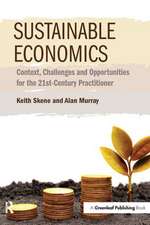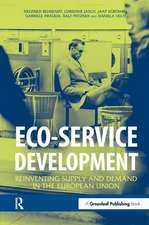CSR and Sustainability: From the Margins to the Mainstream: A Textbook
Editat de Michael Hopkinsen Limba Engleză Paperback – 8 ian 2016
| Toate formatele și edițiile | Preț | Express |
|---|---|---|
| Paperback (2) | 157.45 lei 22-36 zile | |
| Anthem Press – 26 apr 2022 | 157.45 lei 22-36 zile | |
| Taylor & Francis – 8 ian 2016 | 500.93 lei 43-57 zile | |
| Hardback (2) | 780.01 lei 43-57 zile | |
| Anthem Press – 26 apr 2022 | 780.01 lei 43-57 zile | |
| Taylor & Francis – 8 ian 2016 | 1015.26 lei 43-57 zile |
Preț: 500.93 lei
Nou
95.88€ • 104.19$ • 80.59£
Carte tipărită la comandă
Livrare economică 21 aprilie-05 mai
Specificații
ISBN-10: 178353446X
Pagini: 494
Dimensiuni: 156 x 234 x 28 mm
Greutate: 0.73 kg
Ediția:1
Editura: Taylor & Francis
Colecția Routledge
Locul publicării:Oxford, United Kingdom
Public țintă
PostgraduateCuprins
Recenzii
Descriere
• A one-stop reference book for professionals and students of CSR • Contributions from leading specialists in the application of CSR • Translates well-established theories into practical tools Corporate Social Responsibility (CSR) is steadily moving from the margins to the mainstream across the spectrum of private companies, NGOs and the public sector. It has grown from being a concept embraced by a small number of companies such as The Body Shop in the early 1990s to a widespread global movement. At its weakest level, it is represented by a few philanthropic gestures by organizations, but, when applied in its most complete form, it can steer the organization or sector to deliver a fully fledged, systemwide, multi-stakeholder operation, accompanied by multiple types of certification. For the first time, a book brings together key issues relating to CSR as they apply to different aspects of business; it is not another generalist title about CSR. Michael Hopkins, a leading expert in the field, is joined by a number of outstanding contributors to the book, to explain how CSR has evolved since the 1990s and to offer ground–breaking insights and practical and specific applications of the concept. For example, Mervyn King explains Integrating Reporting, Deborah Leipziger looks at CSR, Branding and the Supply Chain, George Starcher provides a framework for Socially Responsible Restructuring, and Adrian Henriques explores Social Accounting and Stakeholder Dialogue.






















